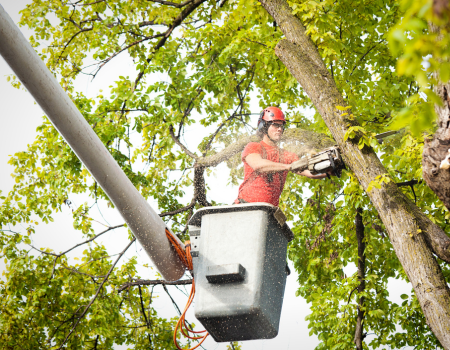
Tree Trimming
Tree limbs growing into high voltage electrical wires can be a deadly combination. Not only are they dangerous, but they can cause inconvenient power outages. It is part of our job at MMU to trim, remove limbs, and remove trees along easements and public rights-of-way so that trees do not come into contact with high voltage electrical wires. This is done for the purpose of public safety and reliability of electrical service.
If you have a tree that is growing close to power lines, please do not attempt to trim it yourself. Call us at (660) 886-6966 and we will remove any limbs needed to obtain proper clearance from the electric lines, free of charge.
Limb on a Line?
Contact UsHow and Why Trees are Trimmed
Tree trimming is a necessary part of providing safe and reliable electric service. The most significant and widespread power outages are caused by extreme weather events (high winds, ice, and snow) and involve trees. Utility systems that don’t prepare for these types of events by maintaining proper clearances can have outages last days or weeks before power is restored. This type of situation is not good for anyone, MMU customers or employees.
MMU utilizes contractors to keep its electric lines cleared. This is done thru a bid process and requires eligible bidders to meet high standards, both in safety and experience. MMU also requires its contractor to have a Certified Arborist on staff to contact landowners before trimming is started on their property. A Certified Arborist is able to assess tree health, growth rate (trim cycles), clearance requirements and other factors that affect safety and reliability.
Trimming is prioritized in the following way:
- High voltage three phase lines serving the greatest number of customers have the highest priority. MMU’s larger circuits can serve anywhere from 500-1200 customers depending on system configuration. These “backbone” lines are our most important to keep on, everything else branches out from there. Because of the higher voltage and importance, these lines require greater clearances and are more likely to have “hazard” trees removed. If these lines are off, lots of people are off.
- High voltage three phase lines serving 100-500 customers. These lines branch off of the “backbone” lines and are also very important. Because of the higher voltage and number of customers served, they also require greater clearance and removal of “hazard” trees.
- High voltage three phase lines serving 50-100 customers. These lines continue to require greater clearance and removal of “hazard” trees.
- High voltage single phase lines serving 1-50 customers. Trimming clearances get reduced from three-phase, “hazard” trees may still qualify for removal.
- Low voltage secondary lines. Since these lines are insulated and typically serve less than 10 customers, they receive the least amount of trimming and tree removals are very rare.
A “hazard” tree is a tree in poor health or a tree prone to storm damage (soft/silver maple, Chinese elm). Chinese elm and soft/silver maple trees also grow very fast and require greater trimming frequency. In the right situation we try to remove these trees if possible. Please do not plant either of these trees in an urban environment. Although they grow fast, they are very susceptible to breaking limbs and damaging property.
In most cases the type of tree planted was not right for the location, planted after the line was installed and neither the current homeowner nor the utility was responsible, but it has to be dealt with. Besides affecting overhead power lines, trees planted in the wrong location can affect sanitary sewer lines. Before planting trees be sure to call Missouri One Call (811) before digging and plant “the right tree in the right place”. There are many resources available to help make the right decisions when planting trees. If you have trouble finding information please feel free to call, we would be happy to assist you.
MMU trims trees for safety and reliability and cuts are made at locations the tree can heal, protecting its health. More often than not, trees trimmed for power line clearance are not the most aesthetically pleasing to look at. Given time, they will fill in and this will improve. Customers have the option to hire someone to have this work done at their cost, but it must be done before it creates an issue. Trees trimmed by MMU employees and contractors are done at no cost, this is included in our rate structure.
It is impossible to eliminate all tree line conflicts but an effort must be made to improve safety and reduce damage during an extreme weather event. It’s not a matter of “if” these events will occur but when.
